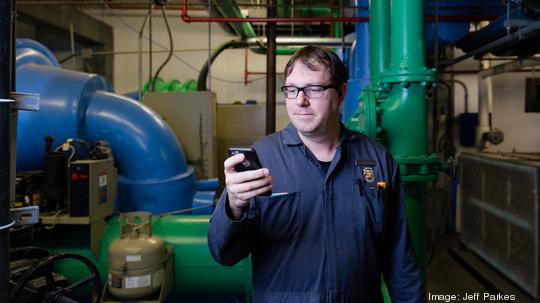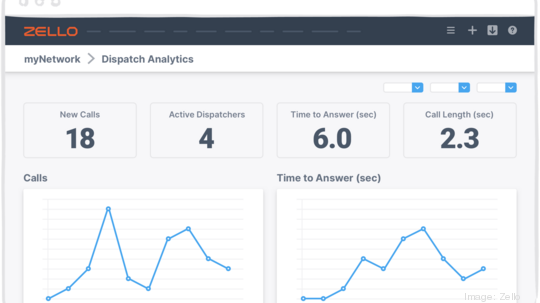
When you're driving or climbing a ladder or simply can't take your eye off what you're doing, text and phone calls can be difficult, if not dangerous.
That's where Zello comes in. The push-to-talk voice communications app has made a name for itself during disasters, including Hurricane Harvey in Texas, and among frontline workers in a wide variety of roles, from construction workers to grocery store clerks, who need to communicate without breaking stride. It acts as an alternative to handheld radios, but you only need a smartphone and a cellular or wi-fi connection.
Now, after being bootstrapped since its founding in 2011 and achieving profitability along the way, Zello is taking on venture capital funding for the first time.
The startup on June 8 announced it has raised $20 million in equity and debt funding, the majority of which is equity, according to CEO Bill Moore. The round was led by two Austin firms – Virgo Capital and Recurring Capital Partners.
Zello, which has a 17,000-square-foot office in Hartland Plaza west of downtown, plans to use the funding to accelerate product development and expand its team of 65 full-time employees to about 75 by the end of the year. The investment also comes after Zello has increased its focus on its paid platform, which integrates into dispatch systems and other internal operations while giving managers oversight and analytics.
"For most of our history, there was enough revenue from the B2B SaaS business that we didn't need to put ads or sell data," Moore said. "Were able to keep the app really clean."
The company's user base has grown through word of mouth, as well as widespread news coverage of its use during demonstrations in Turkey in 2013, protests in Venezuela in 2014 and by groups of rescuers during Hurricane Harvey in Texas in 2017.
While seen as a key utility for organizers, Zello has been blocked, banned or otherwise criticized by oppressive leaders. Zello was initially blocked in Russia in 2017 because it, along with LinkedIn, refused to allow Russia to monitor users' communications. Then, in March, after Russia invaded Ukraine, the country's telecom regulator Roskomnadzor banned the app again, this time alleging it was being used to spread "false information" about the war.
Zello has also been used in Ukraine. Moore said usage increased early in the war, becoming one of the most downloaded apps.
"As is often the case, it's a go-to app in times of crisis," he said. "That communication is pretty valuable to the population."
And Zello prides itself on its role in helping people in crisis.
“We are so proud of the Zello First Responders program where we provide Zello’s enterprise platform at no cost to qualified first responders across the globe,” Zello founder and Chief Product Officer Alexey Gavrilov stated. “The program began in July 2019 and now supports over 1,500 organizations across 65 countries.”

A couple years ago, Moore said the company decided to merge its efforts on its consumer-oriented free app with its paid B2B platform to build out more features that businesses say they need. Their B2B customers include Hyatt and Hilton, as well as PepsiCo and Honda.
"One of the one of the best parts about the business, and this applies to communication technologies, is they're really broad horizontal markets," he said. "So field services would be an example, or IT or AV services, events, hospitality, health care..."
Zello, which competes with other apps such as Tango Tango, reports its app has 170 million registered users and 5 million monthly active unique users. Moore said the company generates around $11 million in annual recurring revenue, and grew 40% year-over-year in 2021.
"Our strength has been bottom up, where these these frontline workers themselves are identifying Zello as a better alternative," Moore said. "And what we're typically competing against or replacing would be old school radios. They've been around 100 years, and the technology works so well. You push a button, you talk, you let go. It's instant. It's voice. You can use your eyes and your hands for something else. You can coordinate lots of people. There's so many great properties of that style of communication. Now it's available on an app, and it works with the rest of their lives and over the Wi Fi or data plans as a modern application that is part of a modern ecosystem."
Zello is increasingly focused on analytics.
"Where in the past, whether it's radios or people using WhatsApp, you have no idea who's speaking, when and how long are they waiting or how busy different parts of the organization are... so it's a great source to understand how efficient it is and what's taking a long time and what's happening with my business," Moore said. "So, security, control and analytics are all really valuable benefits that... our customers appreciate."







